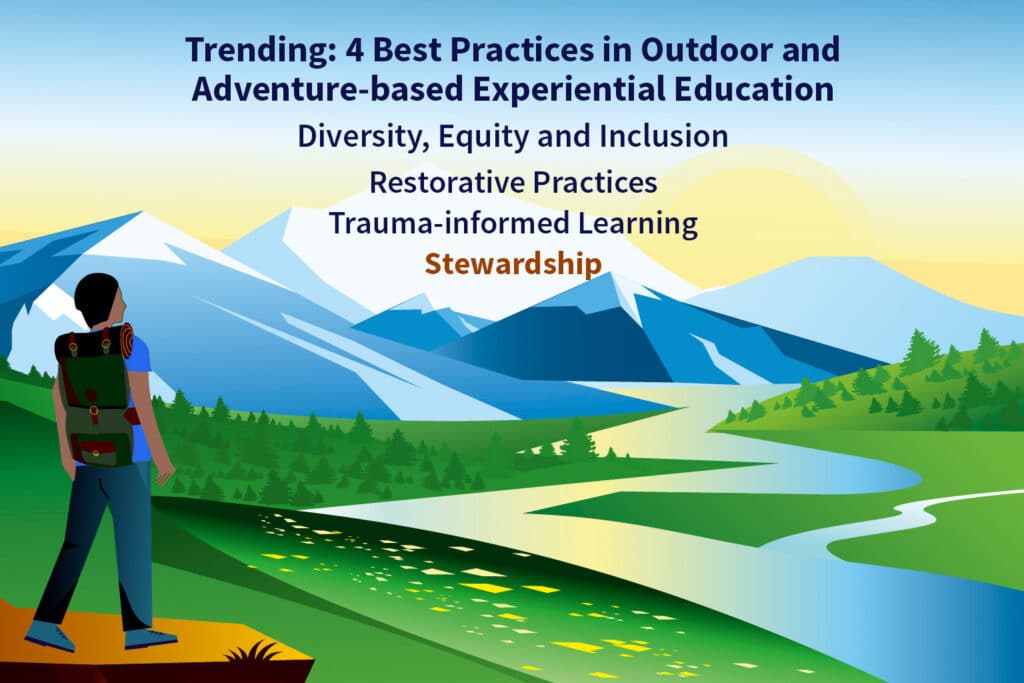Trending: With Increased Participation Comes a Renewed Focus on Stewardship
May 17, 2023
This is the last post in our four-part series on trends to be aware of in outdoor and adventure-based experiential education. In Part 1, we covered DEI (diversity, equity, and inclusion). Part 2 focused on restorative practices. And Part 3 called attention to trauma-informed learning.
Here in Part 4, we’re wrapping up the series with a call for action about stewardship.

According to research from Pennsylvania State University’s Department of Recreation, Park, and Tourism Management and the Leave No Trace Center for Outdoor Ethics, 13 percent of people who regularly participated in outdoor recreation activities prior to the COVID-19 pandemic, stopped doing so once nationwide lockdowns went into effect.
At the same time, that 13 percent was offset by 20 percent more participation coming from people for whom the researchers say were likely entirely new to recreating in local, state, and national parks.
In New England alone, according to an article published in the journal for the International Association for Society and Natural Resources, overall recreation visitation increased by a whopping 61 percent during the summer of 2020. (See: The Outdoor Renaissance: Assessing the Impact of the COVID-19 Pandemic upon Outdoor Recreation Visitation, Behaviors, and Decision-Making in New England’s National Forests for further details.)
With this increased participation, lawmakers in Mississippi, Washington, New Mexico, Arizona, Utah, Virginia, West Virginia, Iowa, and Wyoming introduced legislation to further improve and support engagement in areas known for human-powered outdoor recreation. In fact, no less than 170 new pieces of “outdoor legislation” are currently under consideration in 38 states, according to the National Caucus of Environmental Legislators.
While there’s no denying that increased exposure to — and enjoyment of — the backcountry is great for the nation’s overall health and wellness, time will tell if the same can be said about the natural environment itself. That’s where stewardship comes into play, and it’s why we’re offering it up as the fourth trend for us all to be aware of in outdoor and adventure-based experiential education. More than anything else, we’re urging everyone to double down on stewardship.
Organizations like The National Center for Outdoor & Adventure Education (NCOAE) have always preached about the careful and responsible management of the natural environment. Now, with more people choosing to recreate outdoors, stewardship is more important than ever. As stewards of the lands where we teach and recreate, outdoor educators are best positioned to incorporate lessons on environmental stewardship with each generation of outdoor enthusiasts entrusted to us.
It’s not enough anymore to simply point out the obvious, which is that our staff and the clients we serve need to be stewards of the backcountry. It’s equally important for us to stress that improper or overuse of the backcountry has consequences for individual ecosystems and the very balance of nature itself. Case in point: While almost every car company that sells a pickup truck or SUV chooses to show their vehicles traversing wild places, not every vehicle should.
As the good folks at Wilderness.net point out, the negative impact of human-powered outdoor recreation can be felt through the simple things we do in the backcountry, including:
- Trampling, caused by footsteps, which kills or damages native plants, compacts soil, and can contribute to erosion.
- Campfires, which unnaturally sterilize and destabilize soil.
- Wood collection, which depletes debris that nurtures new vegetation growth in and around campsites.
Here at NCOAE, stewardship is baked into our Educational Framework. Being connected to and caring for others and the environments where we conduct our programs is part of our “theory of change” and is something that guides every decision and action we take with respect to backcountry programming.
If your outdoor education or adventure programming organization doesn’t have a wilderness stewardship plan — something that translates how your policies and guidelines directly figure into the stewardship of the backcountry areas in each of your programs — now’s the time to double down on your efforts to educate the growing population of outdoor enthusiasts.
——-
About the Author: Stephen Mullaney is the Director of School Partnerships at The National Center for Outdoor & Adventure Education (NCOAE). He has worked domestically and internationally with schools, organizations, and wilderness programs. His classrooms have ranged from dilapidated trailers at overcrowded, underfunded schools, to the Himalayan mountains and everything imaginable in between. His past students include gang members/prisoners, education majors, college and university professors, and pioneers in the field of outdoor and adventure-based experiential education. Stephen’s philosophy is to focus on the development of positive working and learning environments. He brings more than a quarter century of education experience and understanding of human nature to any organization, whether it is an education institution or a private company. His writings have appeared in adventure sports/education journals, magazines, and on the web. Stephen prefers to arrive by bicycle and sit in the dirt.
TALK TO US
Have any further questions about our courses, what you’ll learn, or what else to expect? Contact us, we’re here to help!
Leave a comment